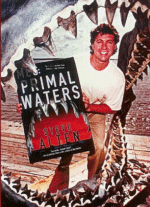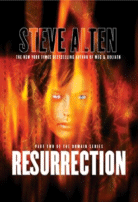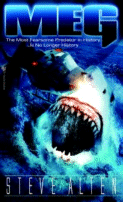A Conversation With Steve Alten
by Claire E. White
New York Times bestselling author Steve Alten

|
After graduation, Steve was an entrepreneur for a several years, before moving to Florida with his family of five. Unhappy in his new job, he decided to write the novel that he had been thinking about for years. Because he worked days and evenings, the only time he could write was from ten at night until three in the morning, and on weekends. In eight months, he finished the manuscript that would eventually be called Meg: A Novel of Deep Terror. Meg became a New York Times bestseller and was optioned to Disney (Hollywood Films) to become a major feature film. A studio shakeup led to the film not being made, although it has just been optioned again by a different studio. To date, the book has sold over one million copies worldwide.
Steve wrote a sequel to Meg, entitled The Trench (Pinnacle), and then Goliath, a story of a victim of oppression who hijacks the world's most dangerous nuclear sub, intent on using its weapons of mass destruction to forge his own road map to peace...unaware the computer than controls the sub has become self-aware. He also began a new trilogy that doesn't involve sharks. Domain (2000) and its sequel, Resurrection (2004) were published by Forge. The series centers upon the Mayan Calendar's 2,000 year old prophecy that predicts humanity will perish on December 21st in the year 2012. A cross between The Matrix and Indiana Jones, Domain and Resurrection are pulse-pounding thrillers with scientific and paranormal elements. The next book in the trilogy, Phobos, is due out in 2005. His books are known for their well-researched science, which he then uses as a springboard for speculative fiction. A dark sense of humor underlies all of his writing: in a bit of poetic revenge, a prominent critic of one of his books became shark food in one of his novels.
As an author, Steve says that he has two goals. First, he says he wants to continue to work hard to become a better storyteller and create exciting page turning thrillers. Second, it's important to him to remain accessible to his readers. Steve reads and answers all his emails; he even uses the names and descriptions of fans who request it as characters in his books.
Steve's newest release is Meg: Primal Waters (Forge). Primal Waters picks up eighteen years after Meg left off. Now, Johnas Taylor, the adventurer who captured the prehistoric Carcharodon megalodon shark named Angel, is older, wiser and overwhelmed by his fractious family and deteriorating financial situation. When a reality show producer offers big bucks for Jonas to join the new survival series, Daredevils, you can bet that Jonas' enemies and the giant megaladon shark have plenty of surprises in store for Jonas, his teenaged daughter and the contestants.
Steve spoke with us about his newest books, Meg: Primal Waters and Resurrection, his road to success and Adopt-an-Author, the influential charity that he founded to help kids who have trouble reading.
What did you like to read when you were growing up?
James Bond books, Dracula, and of course, shark attack stories.
I'd like to talk about your series which started with Domain, and more recently with Resurrection. What was your inspiration for this series?

|
What surprised you the most in the research that you did for this series? How much of the facts in the books are real, as far as the Mayan calendar, the facts about the pyramids and the descriptions of the history of the Olmec civilization?
All of the facts behind the Calendar and the cultures are true. Scary, huh?
In Resurrection, we don't see as much of Michael Gabriel, but we do meet his sons, Immanuel -- who is not interested in ancient prophecies or his role in them -- and Jacob, who embraces his path. How did you create the characters of Jacob and Immanuel? What was the greatest challenge in writing these very different brothers?
The biggest challenge was to keep the story flowing while the boys grew older. Plus the world changes so much over those 20 years.
In Domain and Resurrection, we see quite a bit of the twins' mother, Dominique Vazquez. Dominique is a very interesting woman: she's tough, imaginative, yet she has her doubts. What was your greatest challenge in creating Dominique? Were there any traits were particularly trying to avoid with her? Do you personally admire strong women?
I admire strong women. Dominique changes from Domain to Resurrection. At first she's a victim, then she must prepare herself and her sons.
Can you give us a sneak peek into the next book in the series?
Phobos will bring everything full cycle, including a very real disaster looming over our planet.
Your books often present scientific evidence and facts which are not widely known or taught. Why do you think there is so much resistance to believe or farther examine some of the unusual archaeological and historical findings? Do you think we will make discoveries in the future that change some of our commonly held beliefs?
It's human nature to only want to accept what our puny minds can comprehend. I say puny because we've only been around as a civilized species for about 10,000 years tops. Earth is 4 billion years old.

|
I needed to make him older in order to have teenagers. In the end, I liked the decision because it makes for a unique hero. Plus I relate to his aches and pains.
I have to say that one of the most shocking scenes in the book is the one set in McCovey Cove, where baseball fans wait in the water to catch one of Pat Burrell's homeruns. First off, I take it you're convinced that Burrell will be the hitter of the future? And is that a nice thing to do to baseball fans?
Not sure if Burrell will challenge the homerun record. He's young, so the timeline fit, but he'd better start hitting again. As to the fans...hell, yes.
You have a very dark sense of humor -- has anyone ever told you that? How important is having a sense of humor in life, in your opinion?
It helps when the wife is yelling at me to get off the computer.
| "I enjoy the research. It is the cure to writer's block. It fleshes out every story. While it can make for long hours, I know my readers appreciate the details and accuracy." |
I recall the nightmare of having to help raise my stepson and daughter. Big sharks are easy, believe me.
There is a very interesting after-death experience related in the book by one of the characters. What are your thoughts on this subject? Have you talked to people who have had these experiences?
I have read a lot about after-life experiences, and I am convinced there is something to them. I wanted to use that in Resurrection, which really is a different kind of story, as well as Primal Waters. The character in Primal Waters is named after a real fan who experienced that exact story.
The book has a lot of interesting themes, one of which is the psychology of the adrenaline junkie. Are you an adrenaline junkie? Have you known any? What makes those people tick?
I am not an adrenaline junkie, but I have a fan who is, and consulted with him on the Daredevils.

|
I think the sharks in that area are being conditioned to associate humans with food. These cage divers are causing some major problems. Look for more similar deaths.
Your books have amazing amounts of fascinating facts and science in them: from geology to ancient cultures to prehistoric animals. How do you approach the research necessary for your books? Do you enjoy research or just endure it?
I enjoy the research. It is the cure to writer's block. It fleshes out every story. While it can make for long hours, I know my readers appreciate the details and accuracy. When I wrote Meg, I had no computer, so I went to the public library. Of course, now I have Internet access, which is the most valuable tool there is. I watch a lot of television, Discovery Channel, History Channel, and the Learning Channel, subscribe to Science magazines like Discovery and Scientific American, and (best of all) stay in touch with my readers, who are sometimes my greatest source for information.
Meg was optioned to be made into a movie, but unfortunately did not get produced. What are the prospects for a Meg film down the road? How does an author remain optimistic when dealing with the unpredictable whims of Hollywood?
| "If you want to be published, write about something you feel others would want to read, not necessarily what you know. Then do the research, which will flesh out your story. Before writing, it's best to start with an outline. Who are the main characters? What are their arcs? In other words, what is their personal challenge and how, by story's end, do they resolve it or develop as a person." |
I'd like to talk about the day to day aspects of being a writer. Would you take us through a typical writing day for you?
Up around 8. Hang upside down on inversion boots for my back. Read the newspaper from front to back. Answer email for 2 hours. Then I write, usually to 6 pm.
How do you feel that you've evolved as a writer since you wrote your first manuscript?
I understand stories more, especially the hero's journey. And I spell better.
Tell us about Adopt an Author. How did this program get off the ground?
Adopt-An-Author is a free nationwide non-profit program designed to excite young adults about reading and writing through the use of bestselling thrillers, heroic non-fiction stories, motivational books and direct contact with the authors via personal appearances, classroom phone calls, emails, and interactive websites. It originated when high school teachers began using Meg (rated the #1 book for reluctant readers) to motivate their students to read. By creating the program, I can offer free curriculum materials and direct contact with the teachers/students and authors. I spend at least 20 hours a week running the program. We now have over 3,000 registered teachers. Best of all, the program works.
What are some of your pet peeves in life?
I hate telemarketers and long lines at the post office.
As a father, what are the greatest challenges facing parents today?
Our kids are exposed to too much too soon.
What's your advice to aspiring writers?

|
It's not easy to get published, but don't listen to the nay sayers. First, find a book that lists Literary Agents. Going directly to a publisher is very difficult. An agent can get your manuscript read-assuming he or she likes it. Most agents want a two-page query letter about your story. When I was looking for an agent to read Meg, I sent out more than 50 letters. I received back 27 replies, mostly cards or form letters saying, "thanks, but no thanks." Only three agents wanted to read pages. Two rejected it, one saw the potential. If you are not prepared for rejection, you cannot succeed at anything. Remember, only those individuals who never try never fail.
Return to the August 2004 issue of The IWJ.
More from Writers Write
